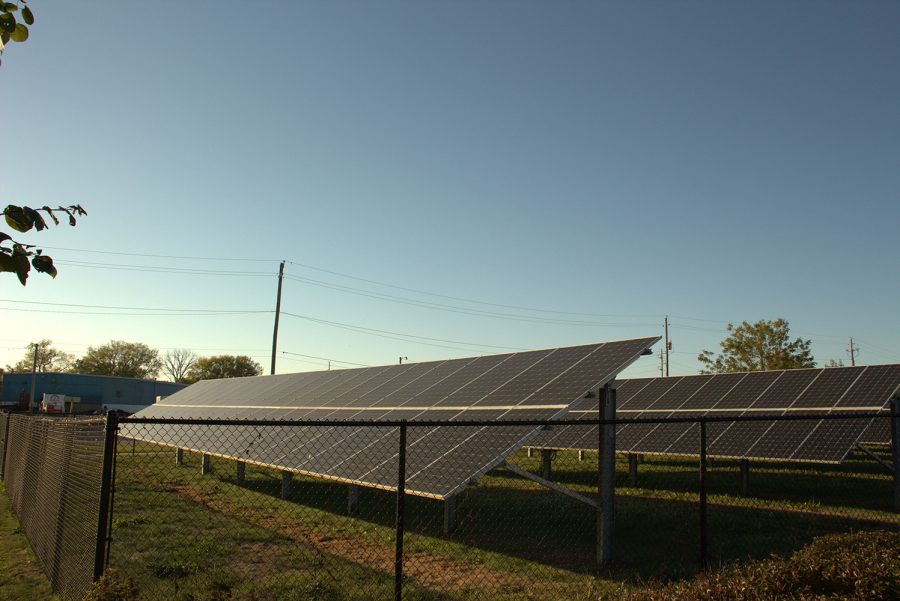Johnson County property owners switch to solar
The Grow Solar Linn + Johnson Counties solar group has added solar panels to 28 properties in Johnson County. Panels were added to 64 properties across the two counties.
Solar panels are seen on Tuesday, Oct. 19, 2021.
November 9, 2021
Homeowners in Eastern Iowa installed dozens of solar arrays on their homes this year, with the help of an area solar organization.
The Grow Solar Linn + Johnson Counties group partnered with 28 homeowners this year to incorporate solar energy into properties in Johnson County. The group installed 64 arrays of solar panels overall between the two counties.
Through this year’s group buy with Johnson and Linn counties, the solar group added 557 kilowatts of solar energy to the participants’ properties, Solar Program Director of the Midwest Renewable Energy Association Peter Murphy said. The association partnered with the counties to administer the program.
Since 2017, the Grow Solar Linn + Johnson County group installed 3,321 kilowatts of solar energy across 477 properties that switched to solar as their source of electricity.
Johnson County, which started this program in 2018, has added solar panels to 249 properties within county limits.
Murphy said the partnership with the two counties has been mutually beneficial.
“There’s this kind of mythos around solar that it’s the technology of the future, and a big part of what we do is letting folks know, under the circumstances, it can happen today quite easily,” he said.
The Midwest Renewable Energy Association has been doing these group buys since 2013, Murphy said, and has conducted 50 of these programs with counties, municipalities, and local organizations across the Midwest.
The association’s mission is to promote renewable energy through education and demonstration.
The Grow Solar program, which ended on Sept. 30, provided education to property owners prior to installation about how solar energy works through free educational presentations.
Murphy said educating the public is necessary because people attending these presentations often come with misconceptions about solar energy, such as panels notwithstanding harsher weather, and the allegedly high price of switching to solar.
“[A] misconception is that solar is really expensive and not worth the investment,” he said. “In general, solar will pay for itself. It’s really just a question of the time horizon on your specific site.”
Becky Soglin, sustainability coordinator for Johnson County, said solar panels provide sustainable energy even during the winter months.
“There will be decreased energy generation in the colder months, but where we live here in Iowa is a good sun profile in that there is enough sunshine to make it worthwhile for many people to add that solar to their roof,” Soglin said.
The installation of the panels for the program was done by the solar energy company Eagle Point Solar, who were competitively selected for this year’s program and were the installers of last year’s program as well, Murphy said.
Lynn Roth, marketing director for Eagle Point Solar, said people not only help save the environment by switching to solar, but also reduce the amount they spend on electricity bills.
“Most of our clients’ electric bills are very small,” he said. “Often, it’s just a connection fee to stay connected to a utility, which is often $15 to $20 a month, but in some cases, we’ve seen zeroed-out monthly utility bills. I’ve actually seen utility bills that credited people’s accounts.”
Roth said the panels installed on participants’ properties are durable and designed to last.
“These panels last decades,” he said. “They got 25-year warranties on them and they’re expected to last in the field for more than forty years.”
Murphy said the problem with generating electricity from traditional natural gases is that homeowners don’t have any equity in the electricity production.
“Any property owner fundamentally understands the benefit of having equity in the property in which they live,” he said. “So, when you buy a solar array, you are building equity, and you own your electricity production.”
Soglin said it was very important to work with Linn County as the collaboration was the first time Johnson County has been a part of a group solar buy beyond the county borders.
“Ultimately, when you’re going to be addressing issues of climate change and sustainability, we really will need regional action, and part of this is making us more resilient as a community as a whole,” she said.
Editors Note: a previous version of this story said the 28 homes incorporated with solar energy were in both Linn and Johnson Counties. While additional homes have incorporated solar energy in Linn, Johnson County was the county responsible for these specific modifications. This inaccuracy has been corrected and The Daily Iowan regrets this error.



